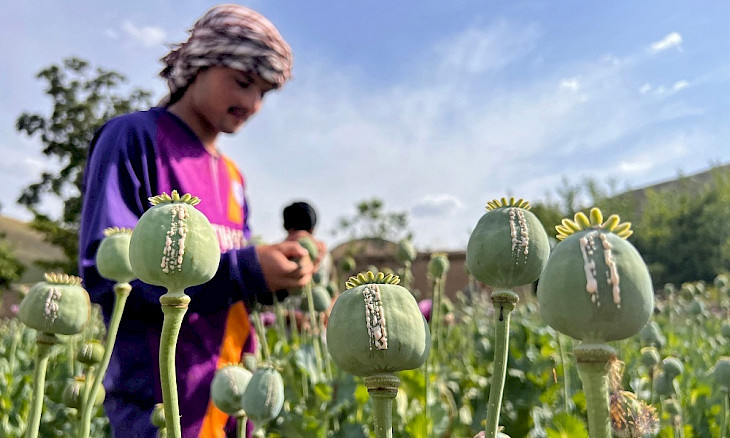Following the Islamic Emirate of Afghanistan’s (IEA) nationwide ban on opium cultivation in 2022, poppy production in Afghanistan has fallen sharply. However, new reports indicate that cultivation is now spreading to neighboring Pakistan and Iran, raising regional concerns about the shifting dynamics of the narcotics trade, Ariananews.af reports.
According to a report by Nikkei Asia, opium poppy cultivation in Afghanistan has declined to around 10,200 hectares in 2025 — a 20 percent decrease compared to the previous year. British geospatial research firm Alcis offered a slightly higher estimate of 12,800 hectares but confirmed that cultivation levels remain dramatically lower than before the IEA ban, when more than 200,000 hectares were used for opium production.
The Afghan Ministry of Interior announced on Sunday that activities related to the cultivation, trade, and trafficking of narcotics have been “effectively reduced to zero” inside Afghanistan. Over the past year, authorities reportedly seized and destroyed nearly 200,000 kilograms of natural and synthetic drugs.
Qasim Khalid, Deputy Minister for Counter-Narcotics, said that under the previous republic government, high-ranking officials were involved in sophisticated cross-border drug networks. He added that 750 traffickers have been arrested and are currently under investigation.
While Afghanistan’s production has dropped dramatically, Alcis reports that opium cultivation has increased in Pakistan, with more than 8,000 hectares under cultivation in just two districts of Balochistan. Iran has also experienced a rise in poppy farming, driven by surging opiate prices and growing demand for cheaper local supplies.
Experts warn that ongoing economic hardship, political uncertainty, and the large-scale return of Afghan refugees from neighboring countries could once again make opium cultivation an attractive livelihood for struggling rural communities. The UN Office on Drugs and Crime (UNODC) noted that “intensified competition for scarce jobs and resources could make opium poppy cultivation more appealing for many families.”
Analysts further caution that deteriorating relations between Afghanistan and Pakistan, coupled with the recent deadlock in Istanbul talks, may increase the risk of a regional resurgence in the narcotics trade, undermining progress made since the Islamic Emirate’s 2022 ban.
CentralasianLIGHT.org
November 11, 2025

